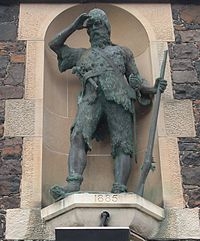
Daniel Defoe’s novel Robinson crusoe, published in 1719, was based on the true story of a Scottish sailor Alexander Selkirk. After a quarrel at sea, he was left, at his own request, on the island of Juan Fernandez, Chile. He was rescued four years later.
Crusoe is the novel’s narrator. He describes how, as a headstrong young man, he ignored his family’s advice and left his comfortable middle-class home in England to go to sea. His first experience on a ship nearly kills him, but he perseveres, and a voyage to Guinea “made me both a Sailor and a Merchant,” Crusoe explains. Now several hundred pounds richer, he sails again for Africa but is captured by pirates and sold into slavery. He escapes and ends up in Brazil, where he acquires a plantation and prospers. Ambitious for more wealth, Crusoe makes a deal with merchants and other plantation owners to sail to Guinea, buy slaves, and return with them to Brazil. But he encounters a storm in the Caribbean, and his ship is nearly destroyed. Crusoe is the only survivor, washed up onto a desolate shore. He salvages what he can from the wreck and establishes a life on the island that consists of spiritual reflection and practical measures to survive. He carefully documents in a journal everything he does and experiences.
After many years, Crusoe discovers a human footprint, and he eventually encounters a group of native peoples—the “Savages,” as he calls them—who bring captives to the island so as to kill and eat them. One of the group’s captives escapes, and Crusoe shoots those who pursue him, effectively freeing the captive.
Defoe probably based part of Robinson Crusoe on the real-life experiences of Alexander Selkirk, a Scottish sailor who at his own request was put ashore on an uninhabited island in 1704 after a quarrel with his captain and stayed there until 1709. But Defoe took his novel far beyond Selkirk’s story by blending the traditions of Puritan spiritual autobiography with an insistent scrutiny of the nature of human beings as social creatures. He also deployed components of travel literature and adventure stories, both of which boosted the novel’s popularity. From this mixture emerged Defoe’s major accomplishment in Robinson Crusoe: the invention of a modern myth. The novel is both a gripping tale and a sober wide-ranging reflection on ambition, self-reliance, civilization, and power.
Credit : Britannica
Picture Credit : Google




